Mohamed Adel Serhani
Domain Specific Benchmarks for Evaluating Multimodal Large Language Models
Jun 15, 2025Abstract:Large language models (LLMs) are increasingly being deployed across disciplines due to their advanced reasoning and problem solving capabilities. To measure their effectiveness, various benchmarks have been developed that measure aspects of LLM reasoning, comprehension, and problem-solving. While several surveys address LLM evaluation and benchmarks, a domain-specific analysis remains underexplored in the literature. This paper introduces a taxonomy of seven key disciplines, encompassing various domains and application areas where LLMs are extensively utilized. Additionally, we provide a comprehensive review of LLM benchmarks and survey papers within each domain, highlighting the unique capabilities of LLMs and the challenges faced in their application. Finally, we compile and categorize these benchmarks by domain to create an accessible resource for researchers, aiming to pave the way for advancements toward artificial general intelligence (AGI)
Intelligent Task Offloading in VANETs: A Hybrid AI-Driven Approach for Low-Latency and Energy Efficiency
Apr 29, 2025
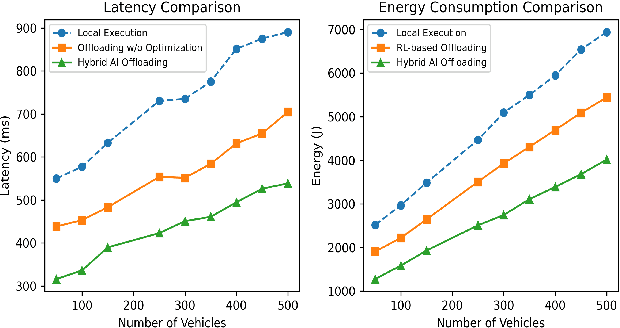
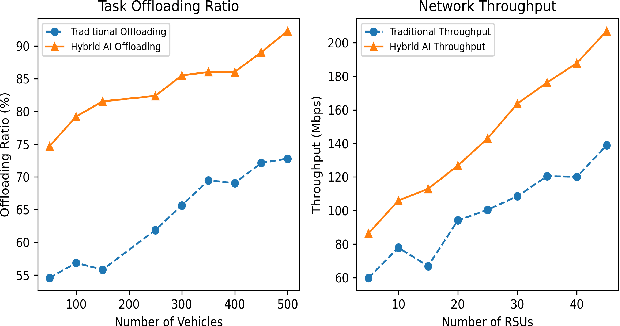
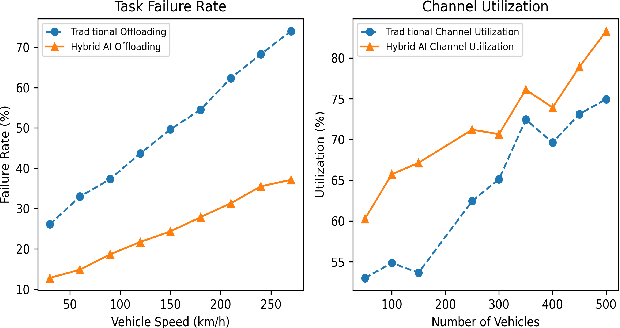
Abstract:Vehicular Ad-hoc Networks (VANETs) are integral to intelligent transportation systems, enabling vehicles to offload computational tasks to nearby roadside units (RSUs) and mobile edge computing (MEC) servers for real-time processing. However, the highly dynamic nature of VANETs introduces challenges, such as unpredictable network conditions, high latency, energy inefficiency, and task failure. This research addresses these issues by proposing a hybrid AI framework that integrates supervised learning, reinforcement learning, and Particle Swarm Optimization (PSO) for intelligent task offloading and resource allocation. The framework leverages supervised models for predicting optimal offloading strategies, reinforcement learning for adaptive decision-making, and PSO for optimizing latency and energy consumption. Extensive simulations demonstrate that the proposed framework achieves significant reductions in latency and energy usage while improving task success rates and network throughput. By offering an efficient, and scalable solution, this framework sets the foundation for enhancing real-time applications in dynamic vehicular environments.
Loss Functions in Deep Learning: A Comprehensive Review
Apr 05, 2025Abstract:Loss functions are at the heart of deep learning, shaping how models learn and perform across diverse tasks. They are used to quantify the difference between predicted outputs and ground truth labels, guiding the optimization process to minimize errors. Selecting the right loss function is critical, as it directly impacts model convergence, generalization, and overall performance across various applications, from computer vision to time series forecasting. This paper presents a comprehensive review of loss functions, covering fundamental metrics like Mean Squared Error and Cross-Entropy to advanced functions such as Adversarial and Diffusion losses. We explore their mathematical foundations, impact on model training, and strategic selection for various applications, including computer vision (Discriminative and generative), tabular data prediction, and time series forecasting. For each of these categories, we discuss the most used loss functions in the recent advancements of deep learning techniques. Also, this review explore the historical evolution, computational efficiency, and ongoing challenges in loss function design, underlining the need for more adaptive and robust solutions. Emphasis is placed on complex scenarios involving multi-modal data, class imbalances, and real-world constraints. Finally, we identify key future directions, advocating for loss functions that enhance interpretability, scalability, and generalization, leading to more effective and resilient deep learning models.
Predicting Bitcoin Market Trends with Enhanced Technical Indicator Integration and Classification Models
Oct 09, 2024



Abstract:Thanks to the high potential for profit, trading has become increasingly attractive to investors as the cryptocurrency and stock markets rapidly expand. However, because financial markets are intricate and dynamic, accurately predicting prices remains a significant challenge. The volatile nature of the cryptocurrency market makes it even harder for traders and investors to make decisions. This study presents a machine learning model based on classification to forecast the direction of the cryptocurrency market, i.e., whether prices will increase or decrease. The model is trained using historical data and important technical indicators such as the Moving Average Convergence Divergence, the Relative Strength Index, and Bollinger Bands. We illustrate our approach with an empirical study of the closing price of Bitcoin. Several simulations, including a confusion matrix and Receiver Operating Characteristic curve, are used to assess the model's performance, and the results show a buy/sell signal accuracy of over 92%. These findings demonstrate how machine learning models can assist investors and traders of cryptocurrencies in making wise/informed decisions in a very volatile market.
Trustworthy Federated Learning: A Survey
May 19, 2023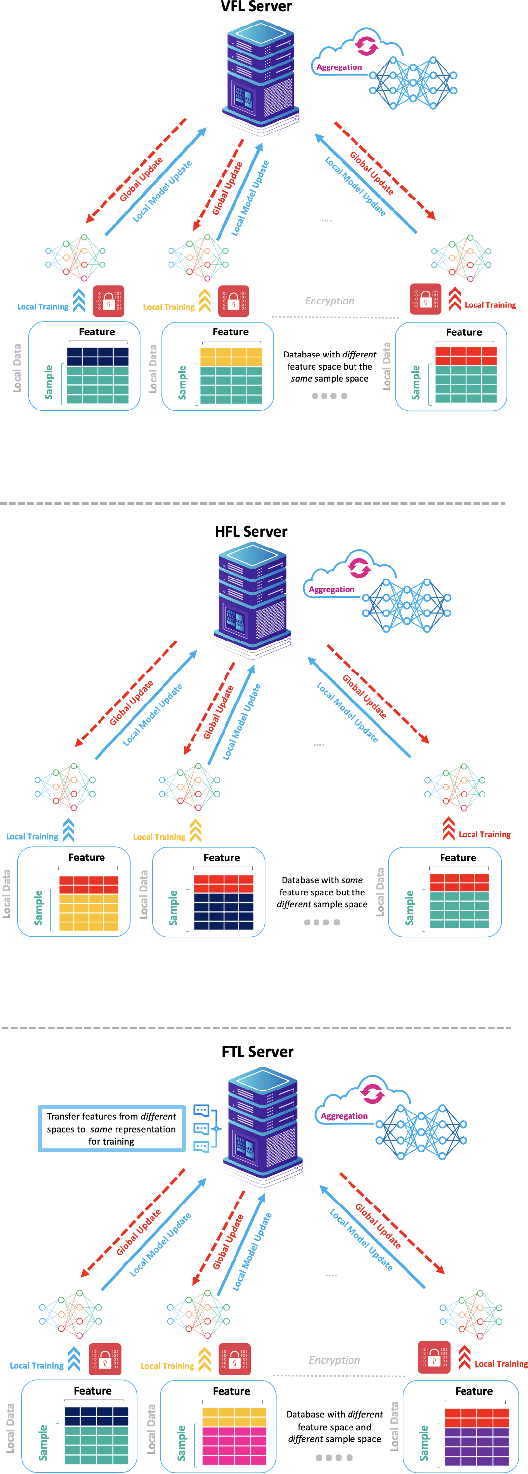
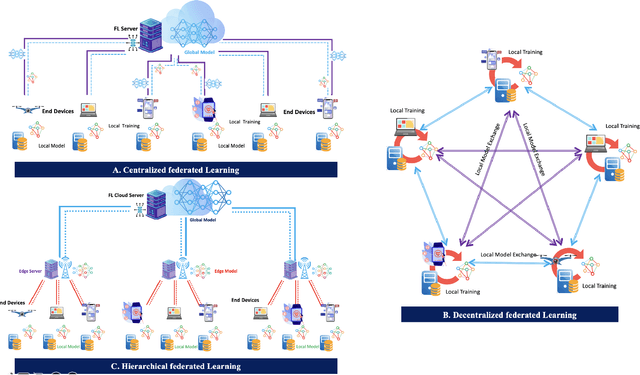
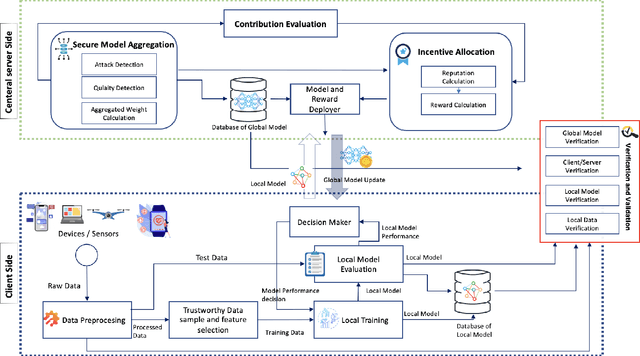

Abstract:Federated Learning (FL) has emerged as a significant advancement in the field of Artificial Intelligence (AI), enabling collaborative model training across distributed devices while maintaining data privacy. As the importance of FL increases, addressing trustworthiness issues in its various aspects becomes crucial. In this survey, we provide an extensive overview of the current state of Trustworthy FL, exploring existing solutions and well-defined pillars relevant to Trustworthy . Despite the growth in literature on trustworthy centralized Machine Learning (ML)/Deep Learning (DL), further efforts are necessary to identify trustworthiness pillars and evaluation metrics specific to FL models, as well as to develop solutions for computing trustworthiness levels. We propose a taxonomy that encompasses three main pillars: Interpretability, Fairness, and Security & Privacy. Each pillar represents a dimension of trust, further broken down into different notions. Our survey covers trustworthiness challenges at every level in FL settings. We present a comprehensive architecture of Trustworthy FL, addressing the fundamental principles underlying the concept, and offer an in-depth analysis of trust assessment mechanisms. In conclusion, we identify key research challenges related to every aspect of Trustworthy FL and suggest future research directions. This comprehensive survey serves as a valuable resource for researchers and practitioners working on the development and implementation of Trustworthy FL systems, contributing to a more secure and reliable AI landscape.
 Add to Chrome
Add to Chrome Add to Firefox
Add to Firefox Add to Edge
Add to Edge